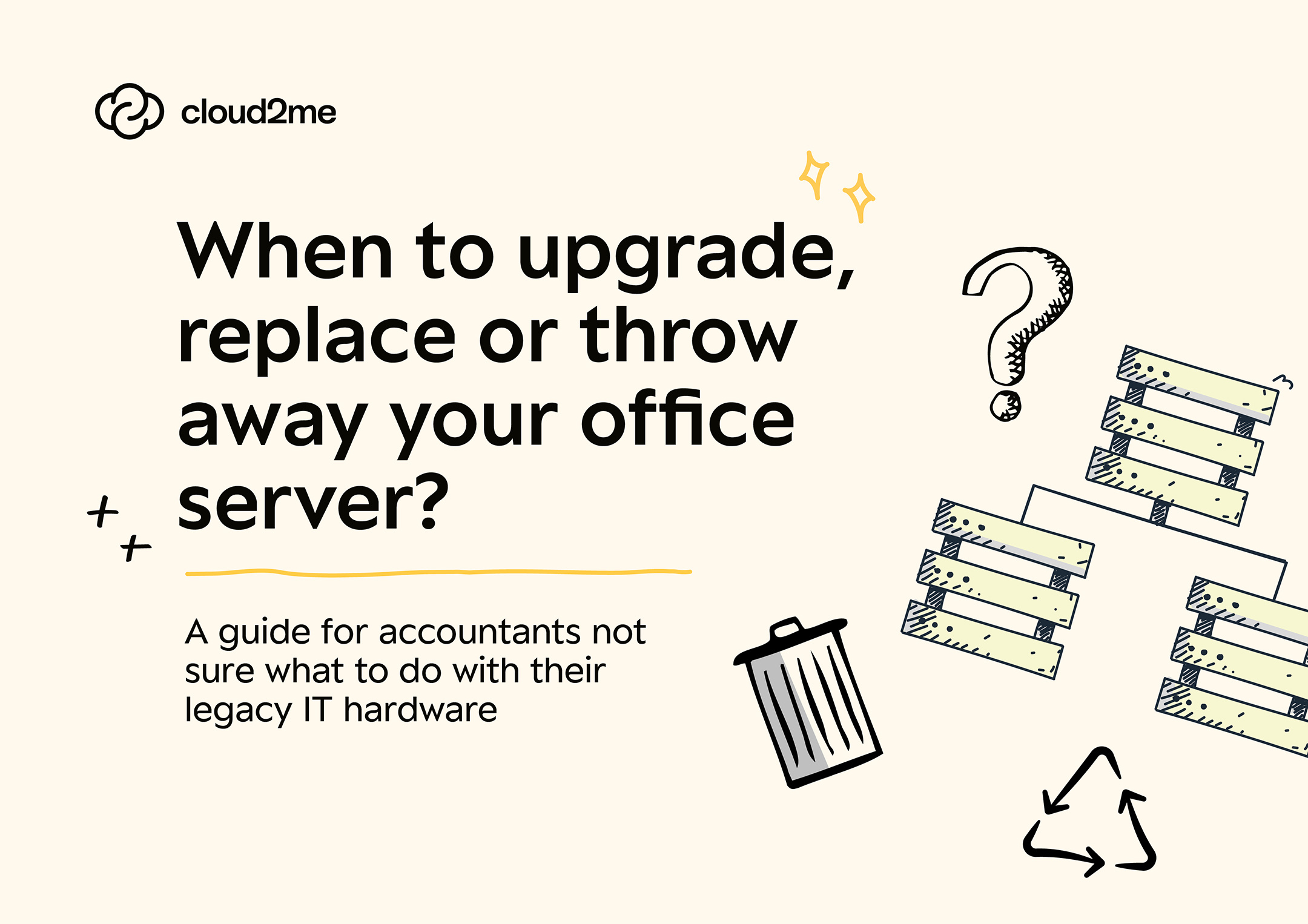Many accounting practices that have been operating for over a decade still have office servers – often tucked away in the ‘comms room’ or even a broom cupboard. These servers once powered everything from shared file storage and email to accounting apps like Sage, Iris, and TaxCalc. But with the rise of cloud storage, Office 365 email, and Software as a Service (SaaS) products like Xero, do you still need your old office server?
Why is the office server slowing down over time?
Servers slow down due to a combination of software and hardware issues. Over time, software can accumulate unnecessarily, files can bloat, and background processes from patches and poorly coded upgrades can consume more system resources.
On the hardware side, components like hard drives, RAM, and cooling systems can degrade, especially if they have mechanical parts that wear out. Dust accumulation and overheating can further impair hardware performance, causing the system to throttle speeds to prevent damage. The biggest performance killer however is growth: more users and more extensive application usage demand more resources, leading to bigger databases and slower performance.
Knowing when it’s time to upgrade or replace your server
There’s a tipping point when applications begin crashing regularly or take so long to load that they become unusable. If you’ve reached this point, you’ve probably already lost hundreds, if not thousands, of productive hours due to a sluggish server. If you and your team wait more than ten seconds for an application to load or process a request, it’s time to upgrade. The loss of momentum and focus from frequent delays can significantly impact staff morale, especially if the issue remains unresolved.
The decision to upgrade or replace your server depends on identifying the bottleneck. If a specific resource (CPU usage, hard disk space, or RAM) is causing the slowdown and your server can be upgraded, then go for the upgrade. Often, slow performance is due to insufficient RAM, which is an easy fix. However, if your server is crashing despite previous upgrades, it might be time to replace it entirely. This can be costly in terms of capital expenditure and time.
When to recycle your server entirely and move into the cloud
Cloud computing offers a solution where you no longer have to worry about upgrading or replacing your office server. If your practice grows, you can quickly increase server resources to meet demand virtually and in real-time. This eliminates the need to wait for applications to load data – everything is lightning fast.
However, cloud versions of your favourite apps are not identical to their desktop counterparts and may require some compromises, especially if run through a web browser. If you can adapt to the new SaaS versions, moving workloads to the cloud can be a cost-effective, long-term solution. But there’s another option that combines the benefits of traditional desktop applications with the flexibility of cloud computing.
Virtual desktops to the rescue
Virtual desktops (also known as Hosted Desktops or Desktop as a Service) offer the functionality of traditional desktop applications with the convenience of cloud computing. They achieve this by copying all the data and applications from your current office server to a ‘virtual server’ (https://www.cloud2me.co.uk/moving-to-hosted-desktop/). These virtual servers reside on powerful servers in data centers across the UK.
Users access their virtual server through remote desktop apps such as Windows Remote Desktop Services (RDS) or Citrix (https://www.cloud2me.co.uk/what-is-citrix-hosted-desktop/). This setup allows employees to access their work environment from any device with an internet connection. Hosted desktops also enhance security and disaster recovery since data is stored centrally in secure data centers, reducing the risk of data loss from hardware failures or theft. Hosted desktop providers typically offer encryption, regular backups, and stringent access controls.
Additionally, hosted desktops reduce the burden on IT infrastructure and management. By outsourcing desktop environment maintenance and updates to a hosted desktop provider, businesses can focus their IT teams on more strategic initiatives. This model also offers scalability, allowing companies to quickly adjust resources based on current needs without significant capital investment.
Picking the right virtual desktop provider for your business
There are three main options for accounting practices considering a hosted desktop solution: in-house, a local Managed Service Provider (MSP), or a specialist accounting hosted desktop provider.
Doing it in-house might seem cost-effective but can come with hidden costs. Most practices lack the size or internal technical expertise to run their own private cloud or use an off-the-peg public cloud provider like AWS or Azure. Costs can spiral if resource usage isn’t carefully monitored.
A local MSP or hosted desktop generalist can be a good option for small to medium-sized practices. They have the technical expertise to set up a virtual server with a public cloud provider and often know your business well. However, they might struggle with the specific demands of accounting applications, especially during busy periods like Year End, requiring seamless integration with other applications.
The final option is using an accounting specialist hosted desktop provider. They offer the best service and performance, with the technical expertise to run their own private cloud or use public cloud providers like AWS. They also have deep knowledge of supporting applications like TaxCalc, CCH, Iris, and Virtual Cabinet. The leading providers in the UK for hosted desktops for accountants are Cloud2Me (https://www.cloud2me.co.uk/), Iris Hosting (https://www.iris.co.uk/products/iris-hosting/), and HDUK (https://hduk.co.uk/).
Reviews on Google and accounting specialist forums can help you choose the best provider for your practice.
Conclusion
Practice Managers, especially those without a dedicated internal IT team, should consider outsourcing as much of their IT systems to an MSP or Hosted Desktop Provider as possible. This ensures smooth operations and 24/7 support for when things go wrong. And with this approach, worrying about whether to upgrade, replace, or remove your server becomes a thing of the past.
Written by Helen Brooks, Head of Commercial at Cloud2Me

